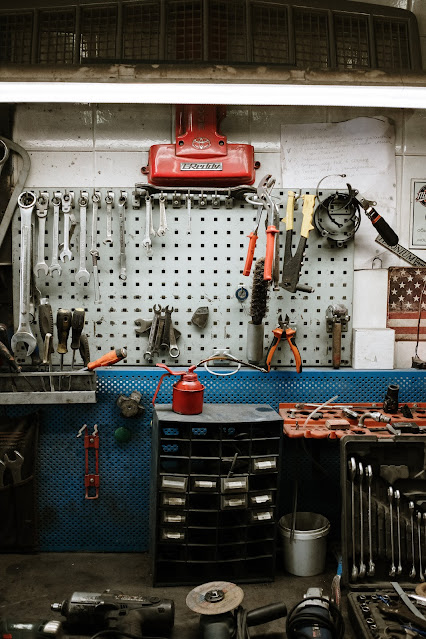Introduction
Most people don't think about how to extend the life of their tools and equipment, but it's something every handyman or woman should consider. By taking better care of your tools, you can make them last longer and avoid the need for costly replacements down the line. Read on for tips on how to do just that!
Keep your tools clean.
Keep your tools clean and dry. It's important to keep your tools in a place where they won't be rained on, or at least minimize the amount of time they are exposed to precipitation. Keeping your tools out of the rain is essential for their longevity, but if you do end up getting them wet, it is still possible to salvage them with proper care. After using a tool outside in wet conditions, remove any excess water from the surface using a clean cloth or towel before storing away again. The same goes for washing by hand—if there's water inside your tool that might have leaked through cracks or seams during use (or even just sitting around), it could lead to corrosion over time.
Clean them with a damp cloth and dry them off afterward. If some dirt or grime gets into an internal mechanism of yours due to use on dirty ground or just being stored in an unclean space, try wiping it down with a damp cloth as soon as possible; if not right away after coming back home from work/the field/etc., then at least within 24 hours afterward so any moisture has had plenty of time evaporate completely before being stored again somewhere else without exposure anymore further down its lifespan path towards eventual failure mode when not properly cared for! This will ensure smooth operation without undue wear on materials used throughout the construction process like steel parts made out of carbon steel which rusts easily when exposed
Sharpen blades frequently.
You can also extend the life of your blades by sharpening them regularly. It’s not uncommon for people to wait until their tools are completely dull before taking them to a professional for sharpening, but that’s not always the best option—especially if you use your tools often and want them to last as long as possible.
Learn how to sharpen the blades yourself. There are plenty of tutorials online (like this one), so it shouldn’t be too difficult to learn how to do this yourself. If you don’t feel comfortable doing it on your own, there are plenty of people who offer blade-sharpening services at reasonable prices .
How often should I sharpen my blades? A good rule of thumb is once every couple of months or so if they aren't being used daily; however, if they're used frequently throughout the day then it might be worth checking up on them more often than that! You can buy an angle guide for about $20 online which will help ensure that all sides are evened out evenly without having any gaps along any edges when finished off properly."
Sand metal tool surfaces.
Sand metal tool surfaces. Metal surfaces can be sanded to improve the grip on a tool. You can also use a metal file to sharpen the surface of your tools, especially if you have an older wood plane that could use some love and care.
To sand down a metal surface, use a piece of fine-grit sandpaper and rub it back and forth over the metal until it shines like new. If you want to add a further protection, you can coat your newly shined tool with linseed oil or beeswax for extra waterproofing protection
Periodically inspect your equipment for wear and tear.
*Periodically inspect your tools and equipment for wear and tear.
*Look for cracks, rust, or other damage that might make the tool unsafe to use. If you find any damage, replace the tool immediately.
*If rust has formed on a metal tool, use a wire brush to remove it; be sure to wear protective gloves while doing this type of cleaning so you do not cut your hands on sharp edges.
*If there are cracks in a wooden handle or another material surface, use a hammer to tap them back into place if possible; if not, replace the item with another one before using it again!
Store your tools in a dry place.
Don't store your tools in damp places. Dampness can cause rust and corrosion, so it's important to keep them away from heat sources and in a dry place or use a protective Cases like this Sentinel Safety Solutions.
When you're done using a tool, clean it up and put it away properly. Dirty tools have more places for bacteria to grow, which can lead to disease or infections if you use the tool again before cleaning it thoroughly.
Take better care of your tools and they will last longer
Take better care of your tools and they will last longer.
Wipe down your tools with a damp rag after every use, especially if you are working with acidic or greasy materials.
Sharpen blades frequently, and sand metal tool surfaces on occasion to remove any rust or corrosion that may develop over time.
Periodically inspect your equipment for wear and tear (like cracks in rubber grips) before it breaks down completely, so you can replace it before accidents happen.
Store tools in a dry place—if possible, try to avoid storing them near water sources like sinks or bathtubs as these can cause rusting over time!
Conclusion
Taking care of your tools is something that all carpenters should do. It will help prevent costly repairs and keep your equipment running smoothly for years to come.








































No comments
We love hearing from you! Thanks for leaving us some comment love! If you're a new follower, please leave your link, so we can follow you back!